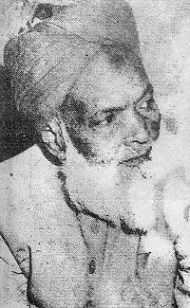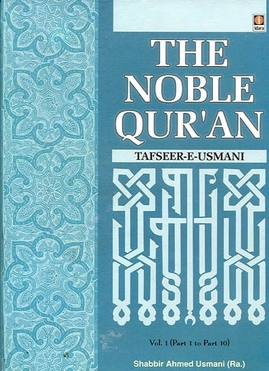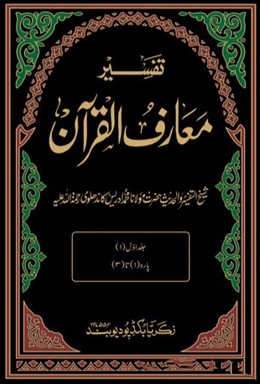Tafsir refers to an exegesis, or commentary, of the Quran. An author of a tafsir is a mufassir. A Quranic tafsir attempts to provide elucidation, explanation, interpretation, context or commentary for clear understanding and conviction of God's will in Islam.

Bahishti Zewar is a volume of Deobandi beliefs and practices written by Ashraf Ali Thanwi and Ahmed Ali Fatehpuri. The book is comprehensive handbook of fiqh, Islamic rituals and morals, it is especially aimed at the education of girls and women. The volume describes the Five Pillars of Islam and also highlights more obscure principles. For years it has remained a favorite with the people of the Indian subcontinent as well as the Indian Muslim diaspora all over the world. It was originally written in the Urdu language but has been translated into a host of other languages including English.

Imdadullah Muhajir Makki was an Indian Muslim Sufi scholar of the Chishti Sufi order. His disciples include Muhammad Qasim Nanautawi, Rashid Ahmad Gangohi, and Ashraf Ali Thanwi. In the Indian Rebellion of 1857, he led the Muslims in Thana Bhawan to fight against British.
Ashraf Ali Thanwi (often referred as Hakimul Ummat and Mujaddidul Millat was a late-nineteenth and twentieth-century Sunni Muslim scholar, jurist, thinker, reformist and the revival of classical Sufi thought from Indian subcontinent during the British Raj, one of the chief proponents of Pakistan Movement. He was a central figure of Islamic spiritual, intellectual and religious life in South Asia and continues to be highly influential today. As a prolific author, he completed over a thousand works including Bayan Ul Quran and Bahishti Zewar. He graduated from Darul Uloom Deoband in 1883 and moved to Kanpur, then Thana Bhawan to direct the Khanqah-i-Imdadiyah, where he resided until the end of his life. His training in Quran, Hadith, Fiqh studies and Sufism qualified him to become a leading Sunni authority among the scholars of Deoband. His teaching mixes Sunni orthodoxy, Islamic elements of belief and the patriarchal structure of the society. He offered a sketch of a Muslim community that is collective, patriarchal, hierarchical and compassion-based.

Abdul Majid Daryabadi was an influential Islamic scholar, philosopher, writer, critic, researcher, journalist, and Quranic exegete active in the Indian subcontinent during the 20th century. He was deeply concerned with modernism, comparative religion, and orientalism in India.

Mahmud Hasan Deobandi was an Indian Muslim scholar and an activist of the Indian independence movement, who co-founded the Jamia Millia Islamia University and launched the Silk Letter Movement for the freedom of India. He was the first student to study at the Darul Uloom Deoband seminary. His teachers included Muhammad Qasim Nanawtawi and Mahmud Deobandi, and he was authorized in Sufism by Imdadullah Muhajir Makki and Rashid Ahmad Gangohi.
Sanaullah Panipati was a Sunni Muslim scholar and an exegete from Panipat who authored the Tafsir al-Mazhari.

Muhammad Qasim Nanawtawi was an Indian Sunni Hanafi Maturidi Islamic Scholar, theologian and a Sufi who was one of the main founders of the Deobandi Movement, starting from the Darul Uloom Deoband.

Muḥammad Shafī‘ ibn Muḥammad Yāsīn ‘Us̱mānī Deobandī, often referred to as Mufti Muhammad Shafi, was a Pakistani Sunni Islamic scholar of the Deobandi school of Islamic thought.
Ma'ariful Qur'an is an eight-volume tafsir (exegesis) of the Quran written by Islamic scholar Mufti Muhammad Shafi (1897–1976). Originally written in Urdu, it is the most prominent work of its author.

Idris Kandhlawi was a Pakistani Sunni scholar during the mid-twentieth century, widely recognized for his contributions to various fields of Islamic studies, including hadith, Quranic studies, Islamic jurisprudence, Prophetic biography, and theology. Holding the titles of Sheikh al-Hadith and Sheikh al-Tafsir, he traced his lineage to Abu Bakr on his father's side and Umar on his mother's side. He studied in Thana Bhawan under Ashraf Ali Thanwi. He studied hadith, first at Mazahir Uloom under Khalil Ahmad Saharanpuri, and later at Darul Uloom Deoband under Anwar Shah Kashmiri. He started his professional career at Madrasa Aminia and later went to Darul Uloom Deoband. In 1929 he took a position in Hyderabad State, where he had access to the Asafia Library. This experience enabled him to produce a five-volume Arabic commentary on Mishkat al-Masabih titled Al-Taleeq al-Sabeeh, of which the first four volumes were published in Damascus. His scholarly work garnered recognition in the Arab world. He later assumed the roles of Sheikh al-Tafsir at Darul Uloom Deoband and Sheikh al-Hadith wa al-Tafsir at Jamia Ashrafia. In addition, he served as the Chancellor of Islamia University of Bahawalpur during its tenure as Jamia Abbasia.
Tafsir Anwar ul Bayan is a five volume commentary (exegesis) on the Quran that was written by Ashiq Elahi Bulandshahri. It was written in Urdu.
Murtaza Hasan Chandpuri (1868-1951) was an Indian Sunni Islamic scholar. He was a disciple of Ashraf Ali Thanwi in the Chishti order of Sufism.

Zafar Ahmad Usmani, was a 20th Century Sunni Muslim Jurist who became an influential figure of the Hanafi school of Sunni jurisprudence's Deobandi Movement. He also was a prominent Pakistan Movement activist.

Tafseer-e-Majidi or Tafsirul Quran: Translation and Commentary of the Holy Quran a complete Tafsir written by Abdul Majid Daryabadi. He was influenced by Ashraf Ali Thanwi to write a Tafsir and then he wrote this Tafsir in English first then in Urdu. The Urdu style and methodology adopted in writing this Tafsir were the same as his English Tafsir. The only difference was that this Tafsir was supposed to be comparatively more lengthy. The author himself wrote the Preface on December in 1941. The author observed that to translate the Quran is very difficult. So, he advised to the translators to follow the six main points and various subpoints to translate the Quran into English. Because he observed some problems to translate into English and he told that, there is no language in the world as well as Arabic. The Introduction was written by Abul Hasan Ali Hasani Nadwi on 16 August in 1981.
This bibliography of Ashraf Ali Thanwi is a selected list of generally available scholarly resources related to Ashraf Ali Thanwi, a leading Islamic scholar, philosopher, writer, preacher, reformer, the author of about one thousands books. He didn't write an autobiography during his lifetime. However, Aziz al-Hasan Ghouri, an authorized disciple of Thanwi, compiled a book from 1935 to 1943, into four volumes entitled Ashraf al-Sawaneh, which is the first and most important book and prime source on the biography of Thanwi. Another Maqalat Hakeemul Ummat was compiled in 34 volumes under the supervision of Taqi Usmani, collected from about 350 publications of Thanwi. This list will include his biographies, theses written on him and articles published about him in various journals, newspapers, encyclopedias, seminars, websites etc. in APA style.

Tafseer-e-Usmani or Tarjuma Shaykh al-Hind is an Urdu translation and interpretation of the Quran. It was named after its primary author, Mahmud Hasan Deobandi, who began the translation in 1909. Shabbir Ahmad Usmani later joined him to complete the exegesis. The translation has gained recognition and appreciation from Urdu-speaking Muslims due to its scholarly approach and insightful interpretation of the Quranic text. One version of the Urdu translation was published by the Government of Saudi Arabia in 1989 through the King Fahd Complex for the Printing of the Holy Quran, while a Bengali translation was published by the Government of Bangladesh in 1996 through the Islamic Foundation Bangladesh.

Maarif al-Quran is an 8-volume interpretation of the Quran written between 1941 and 1982. It was initiated by Idris Kandhlawi and completed by his pupil Malik Kandhlawi. Its purpose was to counter the influence of Western-oriented exegesis trends in South Asia. Idris Kandhlawi's approach to writing this tafsir was rooted in the methodology of his teacher, Ashraf Ali Thanwi's Bayan al-Quran. By following this method, he ensured a systematic and coherent presentation of the Quranic commentary, drawing inspiration from the teachings of the Salaf and the scholarly heritage of Islamic civilization. The tafsir synthesized insights and opinions from renowned commentators throughout history.











